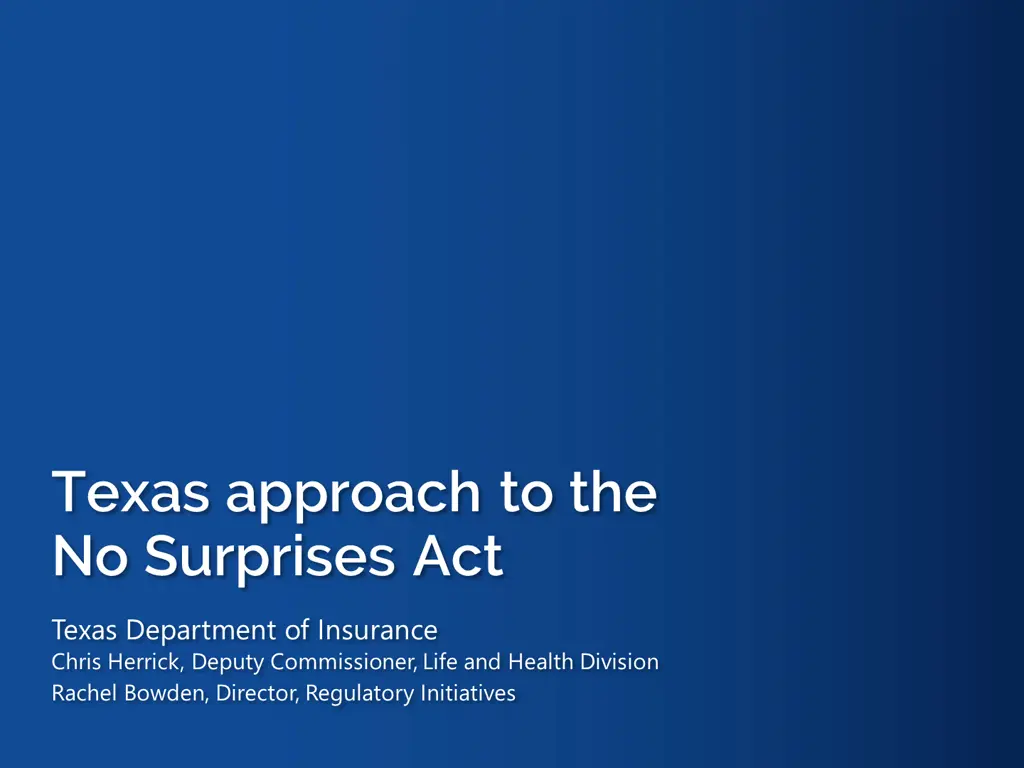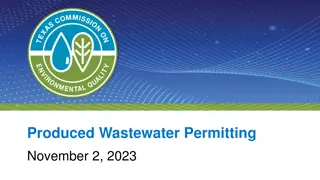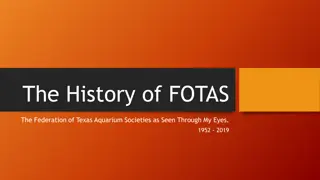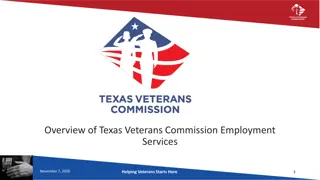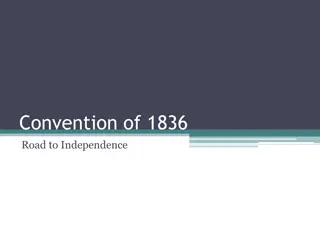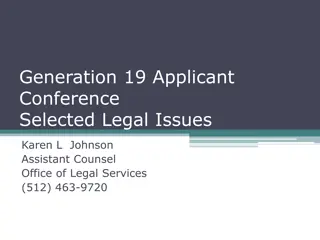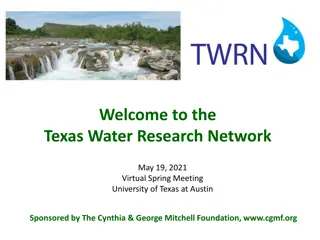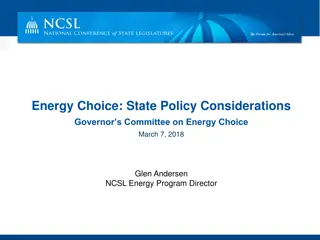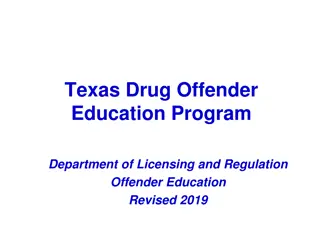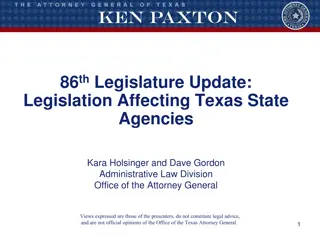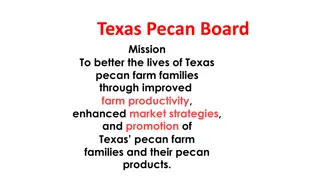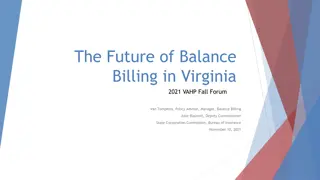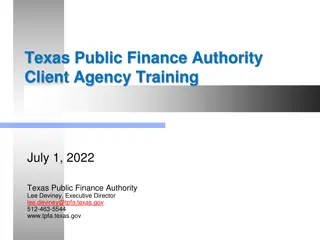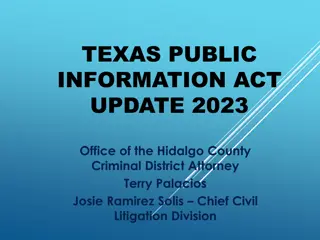Texas approach to the No Surprises Act
Learn about Texas' approach to the No Surprises Act, including balance billing protections and independent dispute resolution processes. Find out how the Texas Department of Insurance and regulatory agencies ensure compliance and enforce consumer protections.
Download Presentation

Please find below an Image/Link to download the presentation.
The content on the website is provided AS IS for your information and personal use only. It may not be sold, licensed, or shared on other websites without obtaining consent from the author.If you encounter any issues during the download, it is possible that the publisher has removed the file from their server.
You are allowed to download the files provided on this website for personal or commercial use, subject to the condition that they are used lawfully. All files are the property of their respective owners.
The content on the website is provided AS IS for your information and personal use only. It may not be sold, licensed, or shared on other websites without obtaining consent from the author.
E N D
Presentation Transcript
Texas approach to the No Surprises Act Texas Department of Insurance Chris Herrick, Deputy Commissioner, Life and Health Division Rachel Bowden, Director, Regulatory Initiatives
Texas approach to the No Surprises Act Texas enacted SB 1264 in 2019 and balance billing protections and independent dispute resolution (IDR) processes have been in place since 2020; The Texas law is considered a specified state law under the No Surprises Act and will continue to apply, with respect to state-regulated plans. No changes expected. The federal surprise billing protections and IDR processes will apply to air ambulance claims and to plans that are exempt from state regulation by ERISA. Other than the surprise billing protections for emergency care and care within an in-network facility, Texas does not have corresponding state laws, or authority to enforce the federal law.
Responsibility for enforcement (plans) Federal provisions (PHSA/CAA/42 USC Appeals for surprise bills PHSA 2719 / Sec. 110 / 300gg-19 Agent commission disclosures for individual and short-term limited duration PHSA 2746 / Sec. 202 / 300gg-46 Surprise billing protections for emergency care and providers within in-network facilities PHSA 2799A-1(a) and (b) / Sec. 102 / 300gg-111(a) and (b) Independent Dispute Resolution (IDR) 2799A-1(c) / Sec. 103 / 300gg-111(c) Enforcement by State vs. CMS? Defer to CMS (as with external appeals under the ACA more broadly). Defer to CMS. Texas will continue to enforce state surprise billing protections for consumers in state-regulated health plans. Texas will continue to enforce state surprise billing protections; federal IDR process would be inapplicable for consumers in state-regulated health plans.
Responsibility for enforcement (plans) Federal provisions (PHSA/CAA/42 USC Database access fees; ID cards; Advanced explanation of benefits 2799A-1(d)- (f) / Sec. 102, 107, 111 / 300gg-111(d) - (f) Air ambulance surprise billing protections and IDR 2799A-2 / Sec. 105 / 300gg-112 Continuity of care 2799A-3 / Sec. 113 / 300gg-113 Price comparison tool 2799A-4 / Sec. 114 / 300gg-114 Provider directory accuracy by health plans 2799A-5 / Sec. 116 / 300gg-115 Removing gag clauses on price and quality info 2799A-9 / Sec. 201 / 300gg-19 Enforcement by State vs. CMS? Defer to CMS. Defer to CMS. Defer to CMS. (Texas provisions are similar but not identical.) Defer to CMS. Defer to CMS. Defer to CMS.
Responsibility for enforcement (providers) Federal provisions (PHSA/CAA/42 USC ER providers cannot balance bill 2799B-1 / Sec. 104 / 300gg-131 Enforcement by State vs. CMS? Texas will continue to enforce state surprise billing protections for consumers in state-regulated health plans. Texas will continue to enforce state surprise billing protections for consumers in state-regulated health plans. Defer to CMS for some providers, depending on authority of various regulatory agencies. Defer to CMS. Facility-based providers in in- network facilities cannot balance bill 2799B-2 / Sec. 104 / 300gg-132 Provider disclosure of balance billing protections 2799B-3 / Sec. 104 / 300gg-133 Air ambulance providers cannot balance bill 2799B-5 / Sec. 105 / 300gg-135
Responsibility for enforcement (providers) Federal provisions (PHSA/CAA/42 USC Providers must give cost estimates 2799B-6 / Sec. 112 / 300gg-136 Enforcement by State vs. CMS? Defer to CMS for some providers, depending on authority of various regulatory agencies. Defer to CMS for some providers, depending on authority of various regulatory agencies. Defer to CMS for some providers, depending on authority of various regulatory agencies. Defer to CMS for some providers, depending on authority of various regulatory agencies. IDR for uninsured consumers whose costs substantially exceed estimate 2799B-7 / Sec. 112 / 300gg-137 Provider continuity of care requirements 2799B-8 / Sec. 113 / 300gg-138 Provider directory accuracy by providers 2799B-9 / Sec. 116 / 300gg-139
Enforcement The Texas Department of Insurance ensures that health plans comply with the balance billing law and IDR processes We ve been successful in educating the industry and helping them come into compliance and have not needed to take enforcement action Provider regulatory agencies are charged with ensuring that health care providers comply with the balance billing prohibition and participate in IDR processes in good faith Agencies may also refer issues to the Attorney General
Provider requirements The Texas Medical Board issued a guidance statement related to surprise billing protections and the authority of the Board to enforce compliance under Occupations Code 164.051(a)(1), 164.052(a)(5), and 164.053(a)(1). The Texas Board of Nursing adopted rules to conform to the balance billing prohibitions in 22 TAC 217.23; and, under 217.11, nurses must know and conform to all federal, state, and local laws and regulations. The Texas Health and Human Services Commission regulates Texas facilities. HHSC rules require provider compliance with applicable sections of SB 1264 and TDI rules. 25 TAC 133.46 Hospitals 25 TAC 135.4 Ambulatory Surgical Centers 25 TAC 137.39 Birthing Centers 25 TAC 139.60 Abortion Facilities 26 TAC 506.37 Special Care Facilities 25 TAC 229.144 Narcotic Treatment Programs 26 TAC 507.50 End Stage Renal Disease Facilities 26 TAC 510.45 Crisis Stabilization Units 26 TAC 510.45 Private Psychiatric Hospitals 26 TAC 564.28 Chemical Dependency Treatment Facilities 26 TAC 509.67 Freestanding Emergency Medical Centers
Texas independent dispute resolution Applies to fully Insured plans, ERS, and TRS Balance billing is prohibited for amounts due beyond cost sharing amounts for: Emergency care Care provided at an in-network facility by an out of network provider Labs & imaging (in connection with in-network care) Two distinct processes for settling payment disputes Arbitration Provider claims Mediation Facility claims Parties can agree to settle their payment dispute Through the health plans appeals process On their own outside of the statutory process By submitting a case through the Texas IDR Process
Texas Independent Dispute Resolution The first 30 days, the parties: 1. attempt to reach an informal settlement 2. review list of 5 arbitrators / mediators and strike up to 2 each (or the parties can agree on who to use) 1. Care is provided 2. Payment is made 3. Dispute exists between the allowable amount and the billed charge After 20 days from date payment is received, either party can submit a case into the Texas IDR process
Arbitration for provider claims 51 days from submission to decision required Day 51 report is due to the parties and the department First 30 days parties seek to settle dispute Day 31 arbitrator is automatically assigned Days 31-51 Mediator receives and reviews information and makes decision based on 10 factors
Mediation for facility claims 180 days from submission to decision required Day 180 report is due to the department on whether an agreement was reached First 30 days parties seek to settle dispute Day 31 mediator is automatically assigned Days 31-180 Mediator attempts to bring parties to a mediated agreement
Resources TDI resources: www.tdi.texas.gov/medical-billing/index.html SB 1264 (86R) text and legislative history (capitol.Texas.gov) IDR statute: Insurance Code Chapter 1467 Rules in Title 28, Texas Administrative Code: Chapter 21, Subchapter OO: Disclosures by Out-of- Network Providers (to waive balance billing protection for voluntary out-of-network care) Form AH025 (waiver of balance billing protections) Chapter 21, Subchapter PP: Out-of-Network Claim Dispute Resolution
